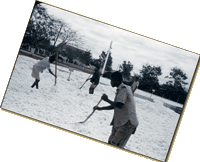“A diary’s soul…”

Dear Deolinda,
In a way, you and I are kindred souls. You poured out your soul in your diary. I have a daily ritual of writing “Morning Pages,” where I reflect about everything from trivia to gossip to concerns about my family and friends to litanies about the aches and pains of aging.
 Remembering you from our brief time together in Angola, I almost laughed as I read passages where you admonished yourself not to talk so much. That’s almost ironic, because you doubtless had plenty to say that people around you wanted and needed to hear.
Remembering you from our brief time together in Angola, I almost laughed as I read passages where you admonished yourself not to talk so much. That’s almost ironic, because you doubtless had plenty to say that people around you wanted and needed to hear.
A year after our group of A-3 missionaries left Angola in 1958, you confessed to your diary in typical college-bound teenage language about how hard it was to think about leaving home: “Caramba,” you said in one entry, as you lamented your upcoming departure, adding, “What a pain,” in a comment about how difficult it was for you to abandon your people and leave your beloved family and friends.
You wrote about the tears your mother shed before your departure, about the sadness of your whole family as you wondered how long it would be before you would be together again.
Even then, you were reflecting about ongoing suffering at the hands of colonial whites, where in Luanda and all over the territory black contract workers working as slave laborers were beaten with whips and toiled every day on the roads or at other jobs presided over by Portuguese mercenaries or government authorities.
Those atrocities are part of my memories as well, as we traveled around the country and observed some of those conditions from a distance, debating in missionary councils whether these were situations that we should report to officials back at the mission board or to U.S. government agencies. We were aware of the likelihood of our immediate departure once Portuguese officials were informed of the source of the leak of this kind of information. We prayed for divine guidance for a solution to the dilemma, and concluded that with our physical departure from the country we would no longer be able to contribute to the very kind of support you needed in those tenuous times. In fact, it wasn’t too many years after that when three members of our missionary community were jailed by the Portuguese under suspicion of collaborating with black Africans to overthrow the colonial government.
That was the Angola you were leaving. As you said in another entry, “We must transform our land; I don’t know how or where we will have the strength to do it, but these conditions cannot continue forever.”
In your diary reflections, you debated with yourself about all kinds of things, including whether it would be better for the cause if you were married. You concluded that it wasn’t necessary.
You continued to write about your dream of becoming a medical doctor, so you could help your people with the gift of healing for their physical needs.
When you celebrated your 25th birthday in 1964, you described yourself as an old woman! You remembered that until you left Angola in 1958 you celebrated birthdays with your parents. Facing so many uncertainties in your life, no wonder your thoughts turned to them on that day with nostalgia and homesickness. Could you have had an inkling of the fate that awaited you in only a few short years? As your poem about Mother Africa speculates, you wondered whether you would survive to become an elder woman. At age 25, it was apparent that you already possessed wisdom and deep caring beyond your years.
Your strong personality comes through loud and clear in your diary, and it’s obvious that you began to be an influence on those around you from an early age and continued by helping to shape the progress of the organizations you believed in. Who knows how much you shaped my life and others around you, continuing long after your life came to a brutal end. As Roberto said in the foreword to your published diary, your writings there came to an abrupt halt. But your voice was not silenced, despite the fact that more than once in your diary you lectured yourself about talking too much.
